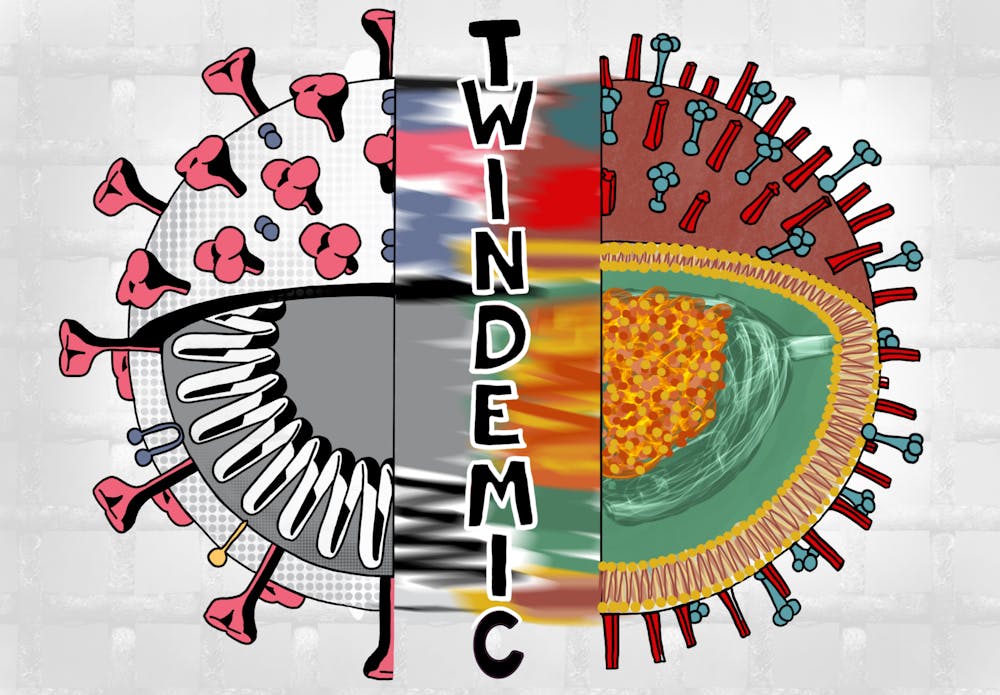With the winter season right around the corner, risk for COVID-19 outbreaks has increased and influenza rates are high, especially in densely-packed communities at the University. Health officials warn about the strong possibility of a simultaneous spike in flu and COVID-19 cases causing a rare phenomenon — a twindemic.
Though COVID-19 cases in Charlottesville are low, they are expected to increase as winter sets in. At the moment, over 400 deaths involving COVID-19 occur each day in the U.S. This number is predicted to increase, possibly upwards of 1000 daily deaths by March if current booster vaccination rates persist, per an updated analysis from the Commonwealth Fund and the Yale School of Public Health.
The rise of new variants, increased indoor interaction compared with the past two years and waning levels of community immunity are leading to increased risk of COVID-19. Combined with high flu rates, the U.S. is facing a viable risk of a twindemic this winter, as Dr. Costi Sifri, director of hospital epidemiology at U.Va. Health, detailed at a U.Va. Health media briefing.
“We could [and] should anticipate a flu season this year,” Sifri said. “We saw a fairly robust flu season in the Southern Hemisphere this summer, their winter in Australia, for example. We should expect to see that now.”
Australia is currently arriving at the end of its worst flu season in five years. The flu season began earlier, and hit children hardest. Notably, this is Australia’s first severe flu season since the COVID-19 pandemic began.
“People are back together, [so] there’s a lot more opportunity for the flu to spread,” Sifri said. “There is a lot less level of immunity to flu since people have not had the flu for a couple years. At the same time, there are opportunities for COVID-19 to be transmitted over the next couple months.”
The CDC reports that the 2020-21 season had the lowest recorded flu activity, furthering the risk of infection, especially among the most vulnerable.
Increased rates of influenza can also be attributed to reductions in community-based preventative methods. Face mask usage, physical distancing and reduced travel helped to stave off a twindemic last year. Now, nearly half of Americans rarely or never wear face masks indoors, despite CDC recommendations. The University’s mask mandate has been lifted, though students are still encouraged to wear masks in public, especially when feeling unwell.
Experts agreed that a lack of mask usage and disregard of vaccine recommendations are the primary factors causing the high risk of a twindemic this winter. If the twindemic is realized, hospitalization rates will rise, putting stress on an already overburdened and understaffed healthcare system.
Housing and Residence Life no longer has isolation housing available to all students who contract COVID-19, so students must take their own precautions if infected. First-year Engineering student Yashasvisai Veeramasu is one of many students who have planned how to isolate themselves.
“My roommate [and I] are actually not from far [away], so we do have the ability to go home if we do end up catching something,” Veeramasu said.
Charlottesville community members and University students can still take several precautionary measures in an effort to remain protected against COVID-19 and the influenza. Most importantly, doctors recommend getting COVID-19 boosters and influenza shots.
“The best thing that we can do to protect ourselves is to make sure we are up to date with our vaccines for both COVID-19 and influenza,” Sifri said.
During the media briefing, Dr. Max Luna, associate professor of cardiovascular medicine, urged University students to take proper precautions.
“Vaccination remains tremendously successful to prevent hospitalization and death by COVID-19,” Luna said.
The current COVID-19 booster is bivalent, targeting two Omicron variants — BA. 4 and BA. 5. The CDC recommends that people five years or older get the bivalent booster if it has been at least two months since their last COVID-19 vaccine dose. For those five years or older who have recently tested positive for COVID-19, the recommendations allow for receiving the next vaccine dose once three months have passed since testing positive.
There are many options to get flu shots and COVID-19 boosters in Charlottesville. The Blue Ridge Health District offers vaccinations at local health departments, a mobile health unit, community events and local pharmacies. Independent pharmacies such as CVS also provide these shots.
Boosters and flu shots are also available through on-Grounds organizations, such as Madison House. Students can make such appointments at any time by registering with the Student Health and Wellness Department.
Most students and staff are fully vaccinated with the first two doses of the COVID-19 vaccine, but they are strongly encouraged by U.Va. Health officials to get their updated boosters.







